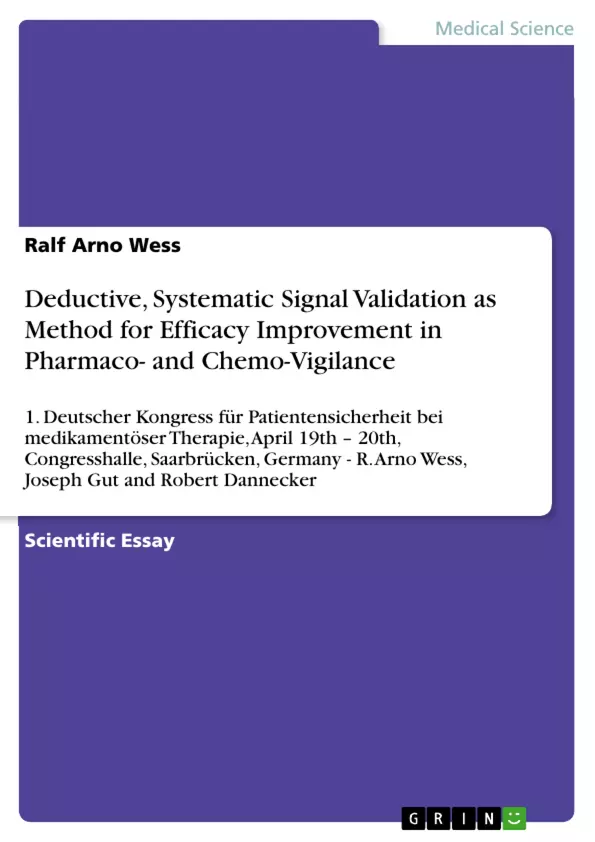Signal Validation can lead Vigilance
Just single ADRs relating the known benzene – toxicologic endpoints (leukemia, breast cancer) and these substances are worth to be investigated completely, since they enable risk assessments based on predisposition and epidemiology much earlier. The need of intelligence tools to deal with such heterogeneous data is obvious. The paradoxical situation that often arises is characterized by information overload but knowledge deficiency, and the need for intellectual involvement in information assimilation4. IT tools for intelligence are designed to assess risks in situations when only bits and pieces of knowledge are available but the situation forces to find the trace of future and past events (like it is the case in criminology, counter-terrorism, and military intelligence).
Inhaltsverzeichnis (Table of Contents)
- Background: Death by Medication
- Method: Signal matching with pre-assessed Pattern
- Results: First Validation steps empower the Theory
- Example: Benzene Toxicity and crossing metabolic pathways
- Benefits:
Zielsetzung und Themenschwerpunkte (Objectives and Key Themes)
The objective of this work is to present a method for improving pharmaco- and chemo-vigilance by using a deductive, systematic signal validation approach. This approach utilizes information organization to identify and validate potential adverse drug reactions (ADRs) earlier, thereby improving patient safety and avoiding financial damage. The method focuses on recognizing patterns and formulating theories of possible ADRs based on known facts and interrelations.
- Adverse Drug Reactions (ADRs) and their high incidence leading to death
- Limitations of clinical trials in detecting rare ADRs
- Signal matching and ontology-based knowledge management for ADR detection
- Benzene toxicity as a case study for illustrating the method
- The need for intelligence tools to manage heterogeneous data in risk assessment
Zusammenfassung der Kapitel (Chapter Summaries)
The Background section highlights the pharmacovigilance crisis, characterized by market withdrawals and a high incidence of fatal ADRs, often undetectable in clinical trials. The Method section details a novel approach using signal matching within an ontology (ADRIS) to identify potential ADRs before they become statistically significant. The Results section presents the validation of this approach using benzene toxicity as an example, demonstrating how the analysis of metabolic pathways can reveal critical molecules and potential risks. The Example: Benzene Toxicity and crossing metabolic pathways section provides a detailed case study of benzene metabolism and its connection to various clinical endpoints, highlighting the potential for metabolic pathway convergence leading to increased risk. The Benefits section outlines the advantages of early risk identification, including improved patient safety and cost savings for various stakeholders.
Schlüsselwörter (Keywords)
Pharmacovigilance, Adverse Drug Reactions (ADRs), Signal validation, Ontology, ADRIS, Benzene toxicity, Metabolic pathways, Risk assessment, Patient safety, Information organization, Knowledge management.
Frequently Asked Questions
What is signal validation in pharmacovigilance?
Signal validation is a deductive method used to identify and verify potential adverse drug reactions (ADRs) earlier than traditional statistical methods by using known facts and patterns.
How can benzene toxicity serve as a model for ADRs?
Benzene toxicity demonstrates how analyzing metabolic pathways and their convergence can predict risks like leukemia or breast cancer based on chemical predispositions.
Why are clinical trials insufficient for detecting all ADRs?
Clinical trials often have limited participant numbers and duration, making it difficult to detect rare or long-term adverse reactions that only appear after market launch.
What is the ADRIS ontology?
ADRIS is an ontology-based knowledge management tool designed to organize heterogeneous data and match signals with pre-assessed patterns to identify potential drug risks.
What are the benefits of early risk assessment in vigilance?
Early identification improves patient safety, reduces fatal incidents, and prevents financial damage caused by late market withdrawals of pharmaceutical products.
- Quote paper
- Ralf Arno Wess (Author), 2005, Deductive, Systematic Signal Validation as Method for Efficacy Improvement in Pharmaco- and Chemo-Vigilance, Munich, GRIN Verlag, https://www.grin.com/document/125407



